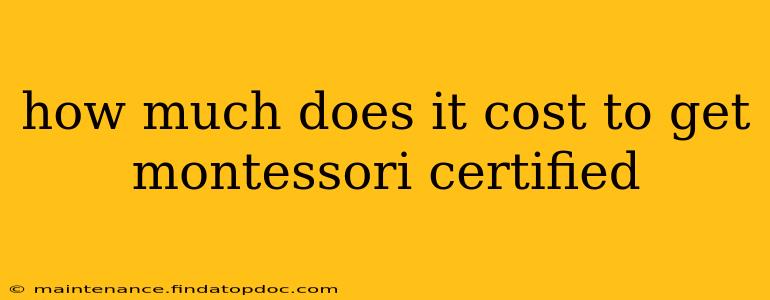How Much Does it Cost to Get Montessori Certified?
The cost of becoming Montessori certified varies significantly depending on several factors. There's no single answer, as the price tag can range from a few thousand dollars to well over $20,000. This guide will break down the key cost drivers and help you understand what to expect.
Factors Influencing the Cost of Montessori Certification:
-
Level of Certification: The most significant factor is the level of certification you pursue. A primary (toddler/preschool) certification typically costs less than a lower elementary (ages 6-9) or upper elementary (ages 9-12) certification. Infant/toddler programs also have their own specialized training. The longer and more intensive the training, the higher the cost.
-
Program Provider: Accreditation and reputation play a major role. Prestigious, well-established programs with a strong reputation often charge more than newer or less-known programs. Check for accreditation from organizations like the American Montessori Society (AMS) or the Association Montessori Internationale (AMI). AMI certification, generally considered the most rigorous, tends to be more expensive.
-
Training Location: In-person programs often cost more than online programs due to factors like facility costs, materials, and travel expenses (if applicable). However, even online programs can vary significantly in price.
-
Program Length: Full-time intensive programs that complete training in a shorter timeframe will generally have a higher overall cost per credit hour or training day. Part-time programs, spread across multiple months or even years, offer a more affordable approach but require a greater time commitment.
-
Materials & Supplies: Some programs include all necessary materials and supplies in the tuition fees. Others may require you to purchase them separately, adding to the overall cost.
-
Additional Fees: Keep an eye out for additional fees such as application fees, exam fees, and potentially renewal fees for your certification.
What are the common costs associated with Montessori certification?
The cost can be categorized into:
-
Tuition: This is the largest expense, typically ranging from several thousand dollars per level to over $10,000 or more depending on the factors mentioned above. For full primary (0-6) certification, expect costs to potentially exceed $20,000 at some institutions.
-
Materials: This can add another several hundred to several thousand dollars, depending on the program and whether materials are included in tuition.
-
Travel & Accommodation (for in-person programs): If your chosen program is not local, you'll need to account for travel expenses like flights, accommodation, and transportation.
How can I find affordable Montessori certification programs?
-
Research Different Programs: Compare tuition, program length, and included materials across multiple programs and providers.
-
Consider Online Options: Online programs can offer significant cost savings compared to in-person programs.
-
Check for Scholarships & Financial Aid: Many organizations offer scholarships and financial aid opportunities for prospective Montessori teachers. Check with the program provider and relevant Montessori societies.
-
Part-time vs. Full-time: A part-time program will likely be spread over a longer duration, leading to a lower overall monthly cost.
-
Look for Programs in Less Expensive Locations: The geographic location of the program can impact the cost.
What are the benefits of getting Montessori certified?
Despite the cost, Montessori certification offers significant benefits, including increased earning potential, career advancement, and the ability to work in a field you're passionate about. The specialized knowledge and skills acquired are highly valued in the education sector.
In conclusion, there is no single answer to the question "How much does it cost to get Montessori certified?". The cost varies greatly depending on several factors. Thorough research, careful planning, and consideration of your budget are essential to make an informed decision. Remember to prioritize finding an accredited program that best suits your needs and financial situation.
